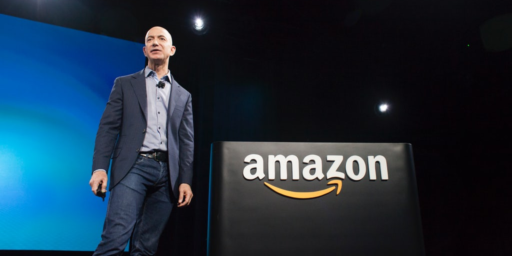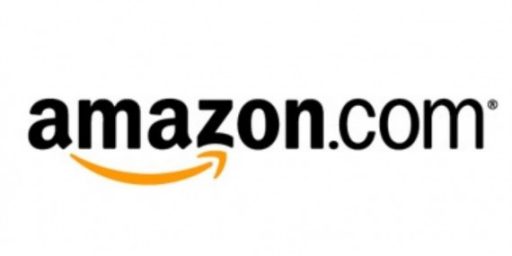Amazon the Publishing House?
Via the NYT: Amazon Signs Up Authors, Writing Publishers Out of Deal
“Everyone’s afraid of Amazon,” said Richard Curtis, a longtime agent who is also an e-book publisher. “If you’re a bookstore, Amazon has been in competition with you for some time. If you’re a publisher, one day you wake up and Amazon is competing with you too. And if you’re an agent, Amazon may be stealing your lunch because it is offering authors the opportunity to publish directly and cut you out.
It has long been known that one of the evolving elements of the publication business in the internet age is the ability of fledgling authors to self-publish (it is possible, for example, to directly publish Kindle version of one’s work through Amazon).
The linked piece is focused on the concept of Amazon directly publishing (in Kindle and physical form) established authors or actively recruiting new ones.






With Jennifer Basye Sander, author of The Complete Idiot’s Guide to Getting Published, noting in an internationally syndicated article last week (sorry, I can’t provide a link–I read newspapers) noting that would be self-publishers need to spend as much time designing the marketing plans for their books as they do writing them, it’s possible that Amazon’s basic goal is simply to pick off the low-hanging fruit in what used to be called “the vanity press.”
I was able to guess this plan and warn my publisher three years ago. I told them Amazon was going into publishing and that within a decade they’d be the biggest publisher around.
The self-pubbing thing isn’t necessarily just for newbies — we’re all looking at it. Something about 70% of digital cover concentrates the mind even more keenly than 10% of cover — the usual royalty. The prices of e-books will drop, but still, 70% of $3.99 beats 10% of $18.99.
@michael reynolds: I’m not just thinking about it, I’m doing it. My partner and I started self-publisihing a series of action/horror novels for the Kindle earlier this year.They’re short and violent — a cross between the single-character pulps of the 1930s and the men’s action adventure novels of the 1970s. After a couple of months of rave reviews and low sales — marketing is hard! — Amazon came to us and said they wanted to take over publication. Minimal advances, and a lower royalty rate than the 70% that self-publishing pays(but much higher than anything I ever got from Pengiun!) — but the full force of Amazon’s worldwide marketing muscle.
We made a deal for 12 monthly books, with options to renew. Also, quarterly paperback anthologies and audio books from Brilliance Audio, an Amazon company. And German versions being translated right now.
They’re using our series, The Dead Man, to help launch their new imprint, 47North, which is dedicated to science fiction, fantasy and horror.
When I told my book agent about this, and explained that he wouldn’t be involved, he responded “anything you can do to get away from the New York publishers is good.”
And he’s right. Dealing with Amazon has been nothing but a joy. They gave us a two-page contract, we ran it past our lawyer who suggested a couple of minor changes — which they did without a quibble. They’re insanely smart and creative, enthusiastic and helpful — they act like the best partner you could ever hope to have.
Will this work? I have no idea. The Dead Man has its formal launch through Amazon at the end of this month, with the republication of the first five volumes and the release of number 6.
@michael reynolds:
Bingo. For the especially “big names” (and btw, that’s in any genre) publishers offer less and less value. Hence folks like Stephen King and Seth Grodin going without.
The key advantage it seems to going with Amazon is that you published has direct control over all aspects of a critical retail channel and distribution network.
btw, Michael, have you ever been to the O’Reilly Publishing Industry conference “Tools of Change?” If not you should think about pitching a panel for it. I think you’d bring a great perspective and probably enjoy it too.
@WR:
First, congratulations!
Thanks for the info on that. We’ve been straining against the current bookstore model which does not allow for monthly series (like Babysitter’s Club, Goosebumps, or our own Animorphs) for some time, frustrated.
We are now looking at combining the usual once a year hard/soft deal with e-book minis to cover the time in between the dead tree books. We’re concerned we’ll take grief from BN and the Indies so we’ll be doing the ebooks shorter — say a single plot line where the dead tree might be three.
The advantage is that we can quickly ramp up ebooks in the event we have a breakthrough.
@mattb:
I haven’t been there — I mostly go where my publisher sends me. But maybe I’ll pitch them since I’m now apparently an expert in transmedia. (No one is more shocked than I am to find myself any sort of expert.)
At this point I still get significant benefit from Harper and Egmont, my two main publishers. But that’s because I’m a series writer so the math works differently in terms of promo: sell book #1 and you’re also selling subsequent books.
But I know a lot of authors, very good, well-published authors, who get dick from their publisher and are basically told to do their own publicity and marketing to readers.
One nice advantage we have in kidlit is the ‘school visit.’ That can be anything from 50 to 300 kids listening to your sales pitch, er, presentation. Bang out two or three of those a day for a couple of weeks and it can start to move the needle on the big sales meter.
@michael reynolds:
Right. And at least with Animorph’s I’m assuming you didn’t own the series rights. What about now? Beyond your contract, could you even jump ship with the series?
My understanding is in general, the genre (including Kid-Lit) published tend to be the ones who tend to add the most value (along with some of the small press) — in part that’s because they seem to be the ones most likely to cultivate new talent and support fan/author relations. Plus it seems like many of them were the first to run real experiments.
Take a look at TOC (http://www.toolsofchange.com/en/home/), it’s a solid event (disclaimer — I’m a huge fan of all things O’Reilly and have spoken at past TOC’s).
How does Amazon handle merchandising rights (or have they even got there yet)?
Yes, I say this while wearing a Game of Thrones T-shirt…
I don’t know. I do think more authors will be going the self-publishing route, but readers like me still have the whole “99.9% of self-published stuff is slush pile-level garbage” situation going on.
Those of us who specialize in the American West as non-fiction have, for years, known that we must either resort to self publishing or never get a book published at all. Strange thing is that I’ve managed to make more on two of my books than a colleague who had a ‘best seller’ and was nominated for a Pulitzer. There’s less prestige, but a heck of a lot more freedom. For ‘no bodies’ like yours truly it is a way to eventually actually have a decent living from your books – if you promote yourself within your niche.
The great annoyance is groups like Western Writers of America refuse to acknowledge us a “regular” members. They only acknowledge someone who has a third party publisher. So, a local writer who lives near me gets a third party to publish his “book” which is little more than a pamphlet. They refuse to acknowledge my 523 page, 2500 footnote book shredding Frank Waters Earp Brothers of Tombstone. So, there are problems to be solved.
But, I think the end is near for mainstream publishing, unless it is a celeb bio or something like that.
I’m working on a book about American fashion from 1860-1910. I’m using about 2000 original photos from the era. The object now is to come up with a way to facilitate the publication of the book not just to the Kindle Fire, but more importantly, iPad.
SJR
The Pink Flamingo
@Brett: Most of your niche books dealing with local or specialized history are self-published. There are some excellent books out there. I’d say 90% of books dealing with the Wild West that are not trade novels are published that way. Heck, my 2nd novel, which I did this way, was even nominated as the top historical fiction by ASU several years ago.
SJR
The Pink Flamingo
Sometime in 2012 I will be self-publishing my first novel and hopefully in 2013 my second. I’m writing both at this moment. Their both sci-fi but grounded in the real world. One is set in the Japanese crime world(The Yakuza) and the other begins with a spaceship crashlanding in Kansas but is about some technology given to earthlings by the aliens goes disastrously wrong about a decade after the aliens leave. A author of both e and print writings is helping edit my work.
I will be epublishing with Amazon too.
@Lit3Bolt: I can’t speak for all their deals, but they left us with complete control over all the trademarks associated with our series, including the name and the logo, and didn’t ask for anything in film or TV, either. They just wanted to publish the books.
Again, the easiest and happiest deal I’ve ever made.
@SJ Reidhead: “The great annoyance is groups like Western Writers of America refuse to acknowledge us a “regular” members. They only acknowledge someone who has a third party publisher. So, a local writer who lives near me gets a third party to publish his “book” which is little more than a pamphlet. They refuse to acknowledge my 523 page, 2500 footnote book shredding Frank Waters Earp Brothers of Tombstone. So, there are problems to be solved.”
It’s not just a problem with Westerns — it’s been hugely controversial in the Mystery Writers of America, too, and no one has figured out how to deal with it yet. How does an organization let in a serious writer like you and filter out the fanficcers and slush-pilers? It’s got to be answered pretty soon…
@michael reynolds: “But I know a lot of authors, very good, well-published authors, who get dick from their publisher and are basically told to do their own publicity and marketing to readers. ”
What do they think of the terms Amazon is offering?
@mattb:
Yeah, we can’t generally pick up a series and go elsewhere. It would be a sorry publisher that ever made that deal.
Each house you deal with has different strengths or weaknesses, and individual deals vary. Scholastic has the awesome power of their book clubs; HarperCollins has advance money and big market penetration; Egmont has autonomy so they can experiment; McMillan has the great Jean Feiwel (the woman who first acquired Animorphs when she was at Scholastic.)
The deals now are all over the map because no one knows for sure how anything will shake out. Once you get into transmedia, as I’m doing with BZ*K, (sorry about the asterisk, it’s an R, but I don’t want that searchable yet) the deals get really convoluted because now we’re splitting up digital and book and there are other writers involved.
Generally in marketing and publicity the publisher becomes a prisoner of the price. By which I mean if they paid me ten bucks they can shrug and write it off. If they paid me a million bucks they have to at least try and get well.
I’ll take a look at that link. Thanks.
@WR: In my field there aren’t a lot of “slush pilers”. Sure, there are some pathetic attempts at self-publication, but in the western field, we take our work seriously. I don’t mind admitting that I find that there are writers in WWA who get someone to take the money and publish their books, then get rid of the “self-publish” status. One has written three 100 page cookbooks. I guess I don’t consider a cookbook a serious piece of research, but because it was “published” by someone else, she gets full membership status.
The really dishonest thing about it is that there are numerous ways to get around “self-publish” by going to the vanity publishing houses, getting their imprint. There are also now front publishers for self-publishing, to get rid of that “stigma”. I find that’s where the real “slush” is.
I specialize in Tombstone and the life of Wyatt Earp. The average “self-publisher” in my field does a tremendous amount of research. My “field” is abjectly vile about sourcing, footnoting, and insuring that we are properly documenting our work. I suspect our standards are far superior to the average university press. The real irony here is that there is recent “mainstream” non-fiction about Tombstone. The author took a very nice advance, swooped in, and did just a tremendous amount of “research”, using the sources we “self-publishers” use, taking it as his own.
The WSJ did a piece on his work, spending two paragraphs about my book, never mentioning me by name, nor my book, but quoting from this author who is profiting from 10 years of my research.
That is what stinks!
SJR
The Pink Flamingo
@michael reynolds: I didn’t see it coming then as you did, but I get it now. For years I noticed a big six publisher in my niche was signing up me and my friends in our industry like crazy. I mean, everyone I knew got a book deal. Why?
Because they were trying to lock all of us up. Fortunately for me I got out of my contract after my first book went out and I know I self-publish. Stop over at http://www.nopublisherneeded.com if you’d like to continue the discussion about the death of traditional publishers.